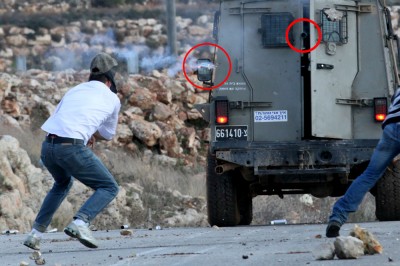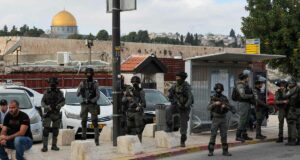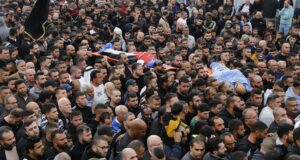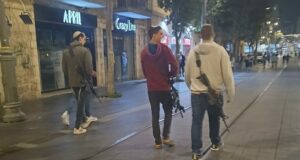9 December 2011 | Popular Struggle Coordination Committee
Mustafa Tamimi, who was fatally injured yesterday during a demonstration in the West Bank village of Nabi Saleh passed away earlier today. Tamimi was hit in the face by a tear–gas projectile shot directly at him, from only a few feet away.
Mustafa Tamimi, a 28 year old resident of Nabi Saleh, was shot in the face yesterday, during the weekly protest in the village of Nabi Saleh. He sustained a critical head injury, under his right eye, and was evacuated to the Belinson hospital in Petah Tikwa. The severe trauma to Tamimi’s brain, caused by the shooting, left the doctors with little to do to save his life, and he eventually passed away at 09:21 AM today.
Tamimi’s funeral will take place tomorrow, leaving Ramallah at 10:00 AM towards Nabi Saleh, where it is expected to reach at around 11:00 AM.

Mustafa Tamimi (left) a moment before his injury. Circled in red are the barrel of the gun and the projectile that hit him. Picture credit: Haim Scwarczenberg
A photo of the incident shows Tamimi at a distance of less than 10 meters behind the semi-open door of an armored military jeep with the gun aimed directly at him. Clearly visible in the photo is also the tear-gas projectile flying in his direction.
The incident took place in the West Bank village of Nabi Saleh today, when dozens gathered for the weekly demonstration in the village, protesting the theft of village lands by the adjacent Jewish-only settlement of Nabi Saleh. After the army dispersed the peaceful march, minor clashes erupted followed by a severe response from the Israeli forces. Several people were hit with rubber-coated bullets and directly shot tear-gas projectiles. Three were evacuated to the Ramallah hospital for further treatment, including a 14 year-old. One protester was arrested.
In complete disregard to the army’s own open fire regulations, soldiers often shoot tear-gas projectiles directly at groups of protesters or individuals. Rubber-coated bullets are indiscriminately shot at protesters from short distances on a regular basis. The Israeli army also resumed the use of high velocity tear-gas projectiles in Nabi Saleh, despite the fact that they have been declared banned for use, after causing the death of Bassem Abu Rahmah in the neighboring village of Bil’in, in April 2009, and the critical injury of American protester Tristan Anderson in Ni’ilin in March of the same year.
The demonstrations, which have been held regularly for the past two years have seen hundreds of injuries to protesters by Israeli forces, as well as dozens of arrests carried out by Israel with the aim of suppressing dissent.
Background
Late in 2009, settlers began gradually taking over Ein al-Qaws (the Bow Spring), which rests on lands belonging to Bashir Tamimi, the head of the Nabi Saleh village council. The settlers, abetted by the army, erected a shed over the spring, renamed it Maayan Meir, after a late settler, and began driving away Palestinians who came to use the spring by force – at times throwing stones or even pointing guns at them, threatening to shoot.
While residents of Nabi Saleh have already endured decades of continuous land grab and expulsion to allow for the ever continuing expansion of the Halamish settlement, the takeover of the spring served as the last straw that lead to the beginning of the village’s grassroots protest campaign of weekly demonstrations in demand for the return of their lands.
Protest in the tiny village enjoys the regular support of Palestinians from surrounding areas, as well as that of Israeli and international activists. Demonstrations in Nabi Saleh are also unique in the level of women participation in them, and the role they hold in all their aspects, including organizing. Such participation, which often also includes the participation of children reflects the village’s commitment to a truly popular grassroots mobilization, encompassing all segments of the community.
The response of the Israeli military to the protests has been especially brutal and includes regularly laying complete siege on village every Friday, accompanied by the declaration of the entire village, including the built up area, as a closed military zone. Prior and during the demonstrations themselves, the army often completely occupies the village, in effect enforcing an undeclared curfew. Military nighttime raids and arrest operations are also a common tactic in the army’s strategy of intimidation, often targeting minors.
In order to prevent the villagers and their supporters from exercising their fundamental right to demonstrate and march to their lands, soldiers regularly use disproportional force against the unarmed protesters. The means utilized by the army to hinder demonstrations include, but are not limited to, the use of tear-gas projectiles, banned high-velocity tear-gas projectiles, rubber-coated bullets and, at times, even live ammunition.
The use of such practices have already caused countless injuries, several of them serious, including those of children – the most serious of which is that of 14 year-old Ehab Barghouthi, who was shot in the head with a rubber-coated bullet from short range on March 5th, 2010 and laid comatose in the hospital for three weeks.
Tear-gas, as well as a foul liquid called “The Skunk”, which is shot from a water cannon, is often used inside the built up area of the village, or even directly pointed into houses, in a way that allows no refuge for the uninvolved residents of the village, including children and the elderly. The interior of at least one house caught fire and was severely damaged after soldiers shot a tear-gas projectile through its windows.
Since December 2009, when protest in the village was sparked, hundreds of demonstration-related injuries caused by disproportionate military violence have been recorded in Nabi Saleh.
Between January 2010 and June 2011, the Israeli Army has carried 76 arrests of people detained for 24 hours or more on suspicions related to protest in the village of Nabi Saleh, including those of women and of children as young as 11 years old. Of the 76, 18 were minors. Dozens more were detained for shorter periods.
 International Solidarity Movement Nonviolence. Justice. Freedom.
International Solidarity Movement Nonviolence. Justice. Freedom.


